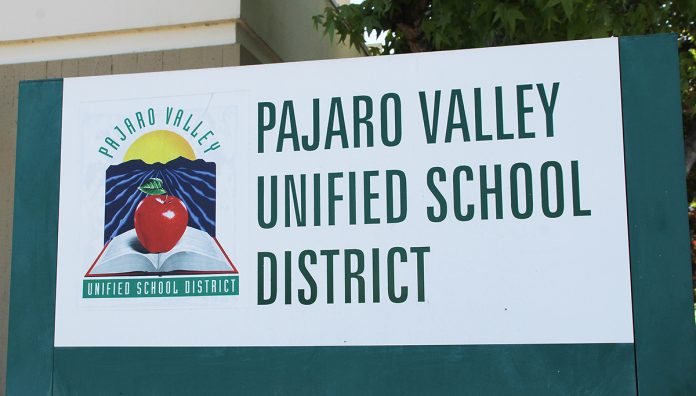WATSONVILLE—A group of teachers from Pajaro Valley High School is planning to file a complaint with their school, citing an ongoing teacher shortage they say causes a threat to student health and safety and makes their jobs untenable.
The teachers filing the Williams complaints say the shortage—they say there are nine unfilled positions while the district claims the number is seven—has left many students without a permanent teacher. Several students whose classes don’t have a teacher simply go to the cafeteria or the library, where they are monitored by a staff member.
Teachers who spoke publicly during Wednesday’s Pajaro Valley Unified School District meeting said that many students are frequently seen wandering aimlessly during class time.
The district has a shortage of 20 teachers, with the majority heaped on Pajaro Valley and Watsonville high schools at eight each, says Pajaro Valley Federation of Teachers President Nelly Vaquera-Boggs.
“These are students in the final years of public education and do not have a teacher of record,” she said.
Williams complaints stem from a 2000 class-action lawsuit, in which Eliezer Williams on behalf of 100 students in San Francisco County sued the State of California and the state’s Department of Education. The suit alleged that the agencies did not provide adequate instructional materials, qualified teachers and safe facilities.
The resultant Williams settlement legislation mandates that school districts must annually submit to inspections of their facilities and availability of textbooks and instructional materials that align to current standards, as well as a number of teacher misassignments and vacant teacher positions.
In the district’s annual Williams report on Wednesday, an investigation of PVHS by four committee members from the Santa Cruz County Office of Education (COE) shows that the school was short seven teachers. That information, the report shows, has been sent to the COE. A representative from that office did not respond to a request for comment by press time.
Vaquera-Boggs says that the district is trying to recruit teachers, but added that such efforts are stymied by what she and other teachers say is low pay compared to surrounding districts of similar size.
“So the district has not had any luck filling the vacancies we have,” she said.
PVFT and PVUSD are in contract negotiations for the current 2021-22 school year. They will discuss subsequent years in future negotiations.
Vaquera-Boggs expressed concern that PVUSD has “sunshined” teachers’ health and welfare benefits for the ongoing negotiations, meaning that district officials plan to bring that item to the bargaining table.
“We’re working with the district on trying to be proactive, and for us, we believe that part of that is ensuring that our salary and our total comp package is a viable and attractive package for potential applicants,” she said. “It’s very disheartening that the district would not fully want to negotiate salaries, that they want to focus on attacking our health benefits.”
PVHS social studies and history teacher Sandino Gomez says that the school’s most dire issue is staffing, which he says stems from inadequate pay.
“If we’re not investing in the teachers that are teaching our students how can we expect our students to succeed,” he said.
Gomez acknowledges that the district offers a good medical benefit plan, but said that should not be used as a bargaining chip in negotiations.
“That shouldn’t be used as a justification to not have adequate salaries, because health care benefits do not pay the bills, they don’t put food on the table and they don’t pay the rent,” he said.
Once the district has received the complaints, it must address the concerns, says PVUSD Assistant Superintendent of Human Resources Alison Niizawa.
This can mean either an immediate solution, or evidence that one is being sought, she says.
For the staffing shortage, for example, the district can show that it is actively trying to recruit teachers. For book shortages, the district can show that it has ordered the books, Niizawa said.
“We look at what’s feasible for the district to do and we offer a response,” she said. “(The teacher shortage) is challenging nationwide. It’s definitely not for lack of trying.
“We have to show we are doing our due diligence to correct things that are brought to our attention.”








